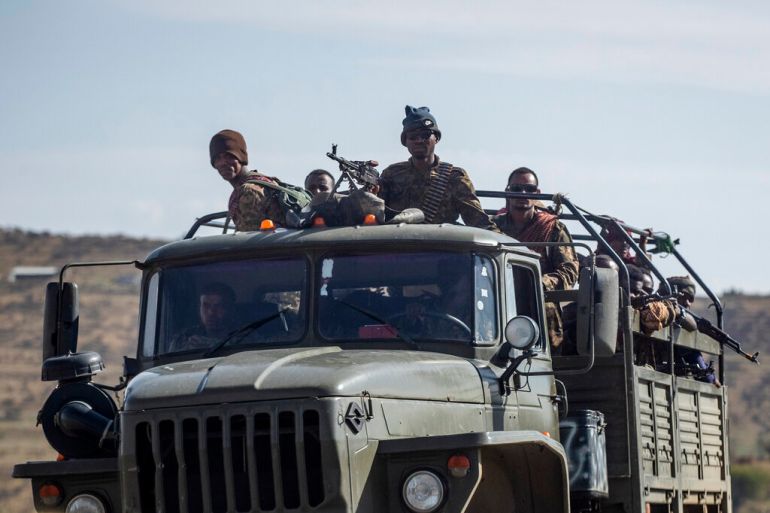US says all sides committed war crimes in Ethiopia conflict
US Secretary of State Antony Blinken says Ethiopian, Eritrean and Amhara forces committed crimes against humanity.

The United States government has concluded that all sides involved in a brutal conflict in the Tigray region of northern Ethiopia have committed war crimes, including rapes, massacres of civilians, forcible deportations and ethnic cleansing.
US Secretary of State Antony Blinken said on Monday that the war crimes had been carried out with “calculated and deliberate” effort by numerous parties during the two-year conflict.
Keep reading
list of 3 itemsUS’s Blinken meets Ethiopian leaders to repair bilateral ties
US announces $331m in new aid to Ethiopia as Blinken meets Abiy
“After the [State] Department’s careful review of the law and the facts, I have determined that members of the Ethiopian national defence forces, Eritrean defence forces, Tigray People’s Liberation Front forces and Amhara forces committed war crimes during the conflict in northern Ethiopia,” Blinken said.
He added that Ethiopian, Eritrean and Amhara forces had also committed crimes against humanity. Hundreds of thousands of people have been killed in the conflict, with some estimates placing the death toll as high as 600,000.
The US determination does not carry any legal weight, but it could bolster calls for accountability against groups and leaders accused of human rights abuses.
Blinken made Monday’s announcement following a visit to Ethiopia last week. He said he was encouraged by progress made there since a “permanent cessation of hostilities” brought the conflict to an end on November 2.
Blinken had met with the peace agreement’s signatories during his visit. He also lauded improvements to the Tigray region, including increased access to humanitarian aid, the restoration of services, the disarmament of “Tigrayan heavy weapons” and the “significant withdrawal” of Eritrean forces.
However, Blinken acknowledged that “much work remains to fully implement” the ceasefire agreement. He told a gathering of Ethiopian civil society leaders that “justice and accountability” would be an important part of building a durable peace.
The conflict in Tigray began in 2020, when Prime Minister Abiy Ahmed sent troops into Tigray to stem an alleged attack on federal army camps.
The violence quickly escalated. The Tigray ethnic group, once a dominant force in Ethiopian politics, became enmeshed in fights with longstanding rivals among the Amhara people and the neighbouring country of Eritrea.
In September 2021, the US announced that it was prepared to bring sanctions against any parties responsible for prolonging the conflict or obstructing humanitarian access.
Eritrean forces joined the war on the side of the Ethiopian government and have been accused of some of the conflict’s worst abuses. They were sanctioned by the US in November 2021.
However, the US has been slow to apply such penalties to other forces accused of abuses, including from the Tigray People’s Liberation Front, Amhara and the Ethiopian military. It remains unclear what steps, if any, the US will take to promote accountability during the uneasy end to hostilities.
In September last year, the United Nations International Commission of Human Rights Experts on Ethiopia issued a report highlighting the impact of the war in Tigray. During the conflict, the government cut the region off from banking, electricity and internet services and restricted access to humanitarian assistance.
At the time, the commission chairwoman, Kaari Betty Murungi, said there was reason to believe that the Ethiopian government was using “starvation as a method of warfare”.